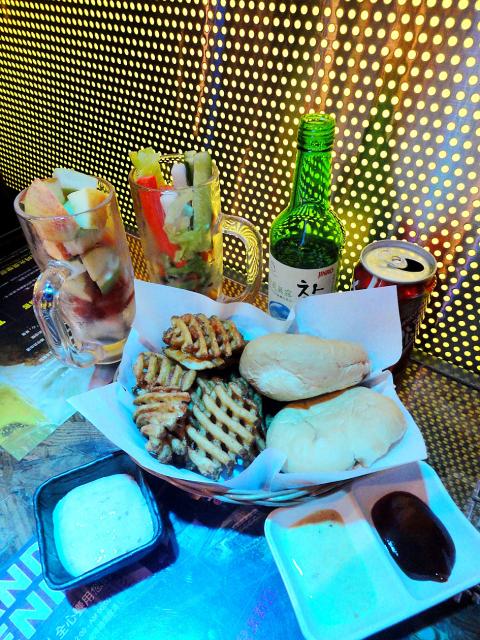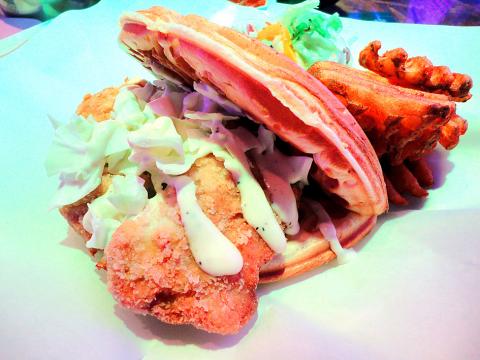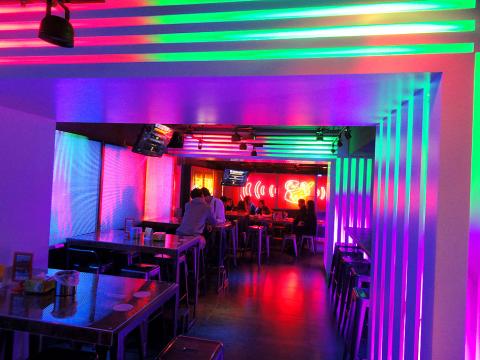East District is the city’s most exuberant area, where you can spot the newest trends in fashion, design, dining and clubbing. A fresh addition to the bustling lanes of Zhongxiao East Road (忠孝東路) screams its presence with dynamic lighting, loud music and a punchy tag line: chicken and beer.
Welcome to TKK The Bar, a new expansion project of the local fast food chain T.K.K. Fried Chicken (頂呱呱).
It’s a gastropub that serves a variety of fried chicken, fries, salads, waffles and alcoholic drinks. Since its grand opening last month, the new endeavor has enjoyed a quick table turnover rate powered by a clientele that is young and hip.

Phopto: Tang Hsiang-yi, Taipei Times
I hadn’t planned to go, but strolling by the glowing box with a friend by chance, I was drawn in by its flashy LED lights.
Just in case the T.K.K. Fried Chicken chain doesn’t ring a bell, it’s a local business founded in the 1970s as an alternative to imported fast food brands like KFC and McDonald’s.
At first glance, TKK The Bar struck me as a brand-new establishment that shares nothing with the chain. The decorative touches of the old-fashioned fast food chain did not make an appearance in this cool, modern-looking bar restaurant.

Photo: Tang Hsiang-yi, Taipei Times
But to my disappointment, the food at TKK The Bar is less impressive than its ambience. The bar menu presents what the fast food chain offers — the usual chicken necks (NT$180), chicken drumsticks (NT$250) and roasted half chicken (NT$349) — with few innovations of its own.
One of the few new items is the fried chicken waffle sandwich (served with a mini salad and waffle fries for NT$210). We ordered the sandwich out of curiosity, and it came just as it sounds: It’s a piece of lemon-flavored chicken chop dressed with morsels of chopped cabbage and sandwiched in a waffle. The citrus flavor of the chicken leaves a zesty aftertaste, but other than that, the dish provided nothing out of the ordinary.
Other items we ordered included the mini pizza buns (an order of two served with assorted fries for NT$180), veggie sticks (NT$80) and an assorted fruit box (NT$100).

Photo: Tang Hsiang-yi, Taipei Times
At T.K.K. Fried Chicken, the mini pizza is my preferred snack — the pocket-sized pizza-in-a-bun warms up a stomach in need of a quick refill. However, having it in a gastropub proved less delightful. Especially when I know one bun costs only NT$45 at the fast food restaurant. The bun at the bar cost more but tasted exactly the same, though it came arranged in a better-looking basket instead of a paper bag.
Both the veggie sticks and fruits came in beer glasses with Thousand Island dipping sauce on the side. The veggies were cucumber, carrot and radish sticks mingled with lettuce and bell pepper slices, while the fruit box comprised morsels of guava, apple and cherry tomatoes. Everything tasted banal.
Still, the merely-average food quality didn’t seem to stop customers from coming, which suggests to me that people don’t go there for the chicken. Instead, TKK The Bar is where friends meet, sit down for a beer and maybe some finger food — even when the volume of dance remixes playing in the bar would definitely prevent diners from having a conversation.
For thirsty diners, the drink menu offers plenty of reasonably-priced options. The selection includes a Taiwanese draft (NT$120), Japanese Kirin draft (NT$150), Thai Singha beer (NT$120) and Korean Hite (NT$120). There’s also a list of Japanese sawa drinks and fun cocktails based on creme de cassis. We picked a bottle of Korean Chamisul Soju (NT$250).
■ Excessive consumption of alcohol can damage your health.

Taiwan has next to no political engagement in Myanmar, either with the ruling military junta nor the dozens of armed groups who’ve in the last five years taken over around two-thirds of the nation’s territory in a sprawling, patchwork civil war. But early last month, the leader of one relatively minor Burmese revolutionary faction, General Nerdah Bomya, who is also an alleged war criminal, made a low key visit to Taipei, where he met with a member of President William Lai’s (賴清德) staff, a retired Taiwanese military official and several academics. “I feel like Taiwan is a good example of

March 2 to March 8 Gunfire rang out along the shore of the frontline island of Lieyu (烈嶼) on a foggy afternoon on March 7, 1987. By the time it was over, about 20 unarmed Vietnamese refugees — men, women, elderly and children — were dead. They were hastily buried, followed by decades of silence. Months later, opposition politicians and journalists tried to uncover what had happened, but conflicting accounts only deepened the confusion. One version suggested that government troops had mistakenly killed their own operatives attempting to return home from Vietnam. The military maintained that the

Before the last section of the round-the-island railway was electrified, one old blue train still chugged back and forth between Pingtung County’s Fangliao (枋寮) and Taitung (台東) stations once a day. It was so slow, was so hot (it had no air conditioning) and covered such a short distance, that the low fare still failed to attract many riders. This relic of the past was finally retired when the South Link Line was fully electrified on Dec. 23, 2020. A wave of nostalgia surrounded the termination of the Ordinary Train service, as these train carriages had been in use for decades

Lori Sepich smoked for years and sometimes skipped taking her blood pressure medicine. But she never thought she’d have a heart attack. The possibility “just wasn’t registering with me,” said the 64-year-old from Memphis, Tennessee, who suffered two of them 13 years apart. She’s far from alone. More than 60 million women in the US live with cardiovascular disease, which includes heart disease as well as stroke, heart failure and atrial fibrillation. And despite the myth that heart attacks mostly strike men, women are vulnerable too. Overall in the US, 1 in 5 women dies of cardiovascular disease each year, 37,000 of them